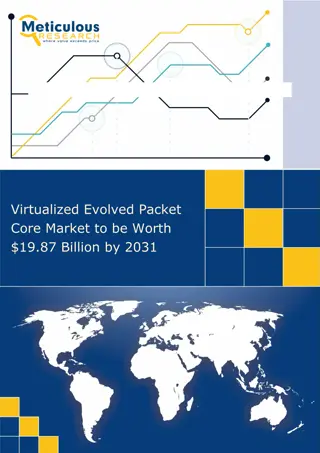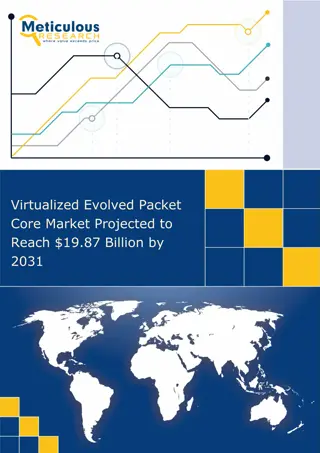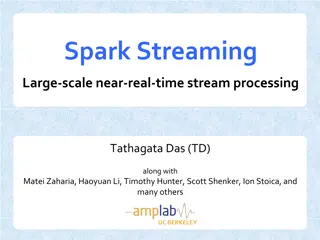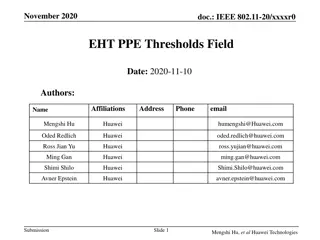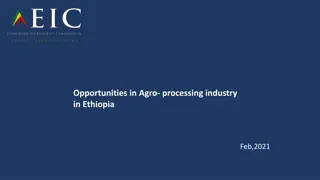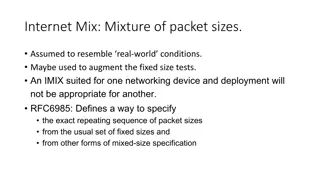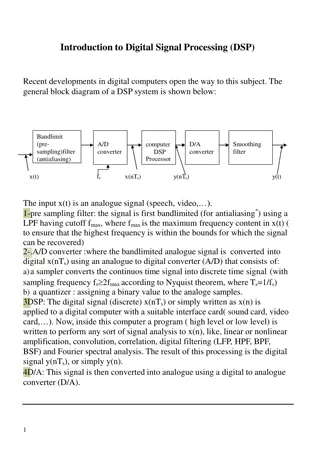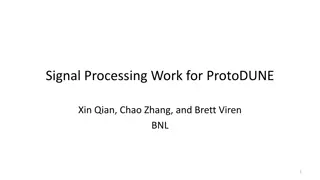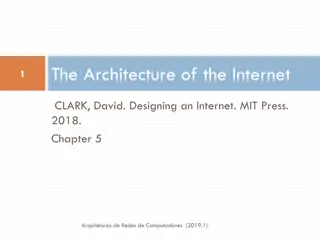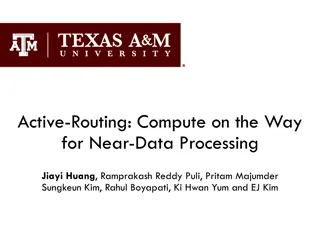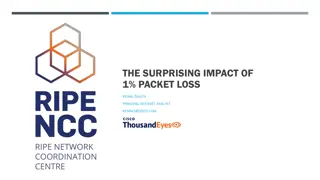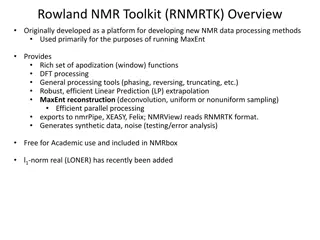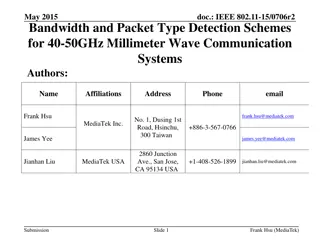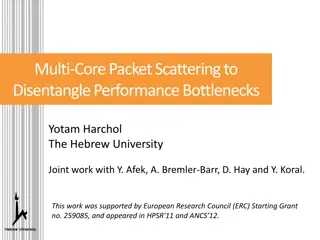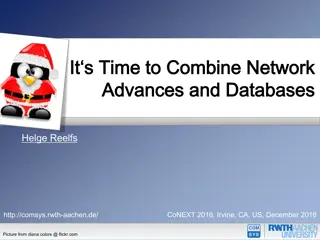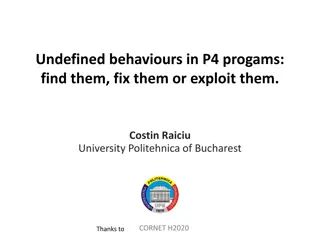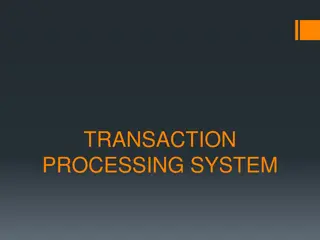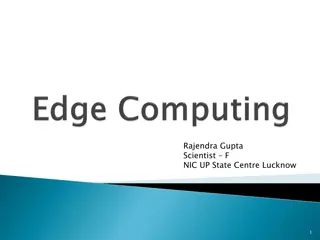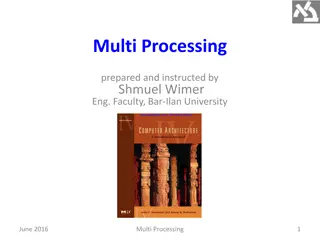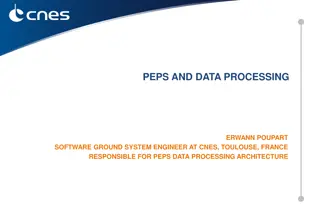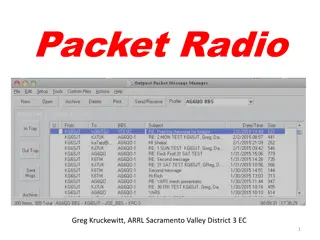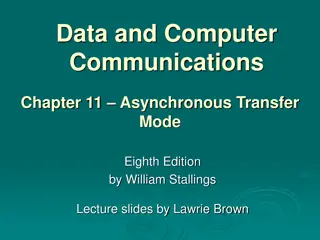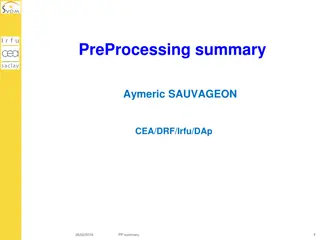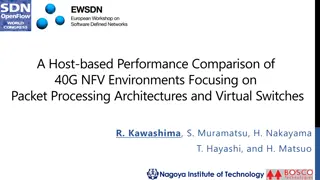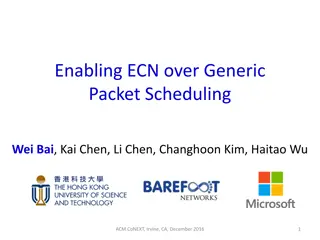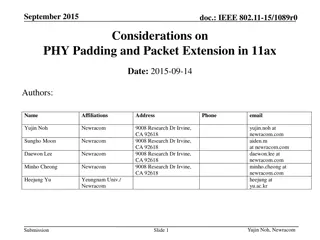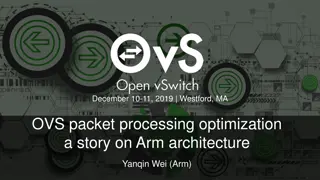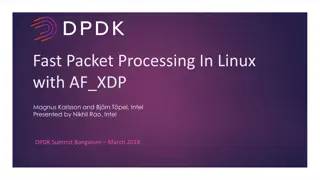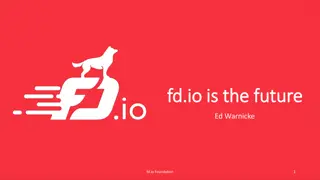National Food Processing Policy and Its Importance
National Food Processing Policy aims to address the significant wastage in food production through value addition and efficient processing. The policy highlights the reasons for food processing, including reducing losses in the supply chain and enhancing quality. It emphasizes creating an enabling e
1 views • 19 slides
Revisiting LDPC Rate Matching in IEEE 802.11 for Improved Performance
The document discusses revisiting LDPC rate matching in IEEE 802.11, focusing on issues such as performance loss compared to previous standards, power consumption in LDPC decoding/encoding, and over puncturing. It covers preliminary concepts, packet size distribution in various devices like laptops
2 views • 17 slides
Virtualized Evolved Packet Core Market
Explore $19.87 billion Virtualized Evolved Packet Core Market: Get exclusive insights on key market trends, segments, geographical analysis, & competitive analysis!\nDownload Sample Report Here @ \/\/ \/download-sample-report\/cp_id=5201
3 views • 6 slides
Virtualized Evolved Packet Core Market Projected to Reach $19.87 Billion by 2031
Explore $19.87 billion Virtualized Evolved Packet Core Market: Get exclusive insights on key market trends, segments, geographical analysis, & competitive analysis!\n
1 views • 4 slides
Introduction to Spark Streaming for Large-Scale Stream Processing
Spark Streaming, developed at UC Berkeley, extends the capabilities of Apache Spark for large-scale, near-real-time stream processing. With the ability to scale to hundreds of nodes and achieve low latencies, Spark Streaming offers efficient and fault-tolerant stateful stream processing through a si
0 views • 30 slides
Introduction to IEEE 802.11-20 EHT PPE Thresholds Field
IEEE 802.11-20 standard defines the Nominal Packet Padding values and Pre-FEC Padding Factors for PE fields in 11ax. The selection of Nominal Packet Padding values is crucial and can be determined using specific methods, including PPE Thresholds Present subfield. The PPE Thresholds field contains in
0 views • 14 slides
Opportunities in Ethiopia's Agro-Processing Industry
Ethiopia stands out as a leader in raw material production for agro-processing industries, offering opportunities in dairy, juice processing, edible oil processing, poultry, beef production, and tomato processing. With abundant resources, suitable climate conditions, and a growing domestic market, E
0 views • 8 slides
Significance of Raw Materials in Food Processing
Effective selection of raw materials is crucial for ensuring the quality of processed food products. The quality of raw materials directly impacts the final products, making it important to procure materials that align closely with processing requirements. Quality evaluation, including microbiologic
2 views • 30 slides
Understanding IMIX in Networking and Testing Tools
IMIX, or Internet Mix, refers to a mixture of packet sizes used to simulate real-world network conditions for testing networking devices. Various tools and methods, such as Genome Reporting, Moongen, T-Rex, and Spirent TestCenter, implement IMIX with specific packet size distributions and characteri
1 views • 8 slides
Overview of Digital Signal Processing (DSP) Systems and Implementations
Recent advancements in digital computers have paved the way for Digital Signal Processing (DSP). The DSP system involves bandlimiting, A/D conversion, DSP processing, D/A conversion, and smoothing filtering. This system enables the conversion of analog signals to digital, processing using digital co
1 views • 24 slides
Advancements in Signal Processing for ProtoDUNE Experiment
The team, including Xin Qian, Chao Zhang, and Brett Viren from BNL, leverages past experience in MicroBooNE to outline a comprehensive work plan for signal processing in ProtoDUNE. Their focus includes managing excess noise, addressing non-functional channels, and evolving signal processing techniqu
1 views • 23 slides
Understanding Sampling and Signal Processing Fundamentals
Sampling plays a crucial role in converting continuous-time signals into discrete-time signals for processing. This lecture covers periodic sampling, ideal sampling, Fourier transforms, Nyquist-Shannon sampling, and the processing of band-limited signals. It delves into the relationship between peri
1 views • 60 slides
Understanding Packet Radio: A Comprehensive Guide
Packet radio, utilizing VHF FM technology, is a digital mode allowing keyboard-to-keyboard communication, messaging, mailboxes, bulletins, and more. It uses the AX.25 protocol and operates at varying data rates on VHF and HF bands. The system comprises basic stations and automated nodes, each requir
0 views • 20 slides
Programmable Parser and Header Definitions at University of South Carolina
Programmable parsers and custom header definitions play a crucial role in network packet processing. This presentation by Jorge Crichigno at the University of South Carolina covers topics such as parser operation, predefined states, and header formats. The content delves into the capabilities of pro
1 views • 22 slides
Understanding Internet Architecture and Networking Principles
The content explores the architecture and goals of the Internet, focusing on its original objectives, survivability in the face of failure, and evolving requirements. It delves into how networks function, describing behaviors and packet handling. Additionally, it discusses the framework for describi
0 views • 15 slides
Enhancing Near-Data Processing with Active Routing
Explore the implementation and benefits of Active-Routing for efficient data processing in memory networks. Motivated by the increasing demands for memory in graph processing and deep learning, this approach aims to reduce data movement, energy consumption, and costs associated with processing large
0 views • 46 slides
Understanding the Impact of 1% Packet Loss on TCP and the Cubic Congestion Avoidance Algorithm
Delve into the surprising effects of even 1% packet loss on network flows, the methods TCP uses to mitigate loss, and how the CUBIC congestion avoidance algorithm works. Explore the researched but not quantified problem of packet loss and learn about a test methodology using Ubuntu hosts to measure
0 views • 24 slides
FY25 Title III Consortium Packet Overview
FY25 Title III Consortium Packet provides information on English Language Proficiency allocations, consortium formation, grant management, board approval requirements, and responsibilities of the lead fiscal agent. English Learner counts determine funding eligibility, with consortiums formed to reac
0 views • 15 slides
Overview of RNMRTK Software for NMR Data Processing
Rowland NMR Toolkit (RNMRTK) is a comprehensive software platform primarily used for NMR data processing tasks such as running MaxEnt, apodization, DFT processing, linear prediction, and more. It offers a robust set of tools for various processing needs and supports efficient parallel processing. RN
0 views • 17 slides
Bandwidth and Packet Type Detection Schemes for 40-50GHz Millimeter Wave Communication Systems
The document discusses bandwidth and packet type detection schemes for 40-50GHz millimeter wave communication systems in IEEE 802.11aj specifications. It proposes a preamble design for auto-detection of bandwidth and packet type to improve channel estimation and decoding efficiency. By utilizing dif
0 views • 27 slides
Enhancing Network Security Through Multi-Core Packet Scattering and Deep Packet Inspection
Explore the use of multi-core systems to tackle performance bottlenecks in network intrusion detection systems, specifically focusing on deep packet inspection. Techniques such as load balancing and pattern subset scanning are discussed to optimize DPI processes and improve overall network security
0 views • 43 slides
Advancements in Network and Database Integration
This presentation discusses the convergence of network advancements and database technologies, highlighting key challenges such as packet processing at increasing line rates and latency issues. It explores the current landscape of databases from a research perspective and proposes solutions for opti
0 views • 13 slides
Understanding Undefined Behaviours in P4 Programs
Explore the implications of undefined behaviours in P4 programs, discover how to identify and address them, or even leverage them to your advantage. Delve into the world of P4 programming, where you can manipulate packet processing sequences, match-action tables, and packet transformations within a
0 views • 66 slides
Understanding Transaction Processing Systems (TPS)
Transaction Processing Systems (TPS) are vital components in capturing, storing, and processing data generated from various business transactions. They ensure efficient handling of high volumes of data while maintaining accuracy, security, and privacy. TPS operate through automated data entry, batch
0 views • 24 slides
Centre of Excellence in Signal Processing Activities and Progress Report
Broad areas of signal processing activities at the Centre of Excellence in Signal Processing include audio, speech, language, medical image processing, computer vision, wireless communications, and machine learning. The center focuses on addressing various challenges in audio/speech recognition, emo
0 views • 17 slides
Exploring the Evolution of Data Communications: A Brief Overview
Delve into the progression of data communications from Morse code to modern radio email systems like Winlink. Discover the history of protocols, technologies, and the impact of the internet on amateur packet radio. Unravel the development of ARQ data protocols, X.25 packet switching, and the transit
0 views • 51 slides
Understanding Edge Computing for Optimizing Internet Devices
Edge computing brings computing closer to the data source, minimizing communication distances between client and server for reduced latency and bandwidth usage. Distributed in device nodes, edge computing optimizes processing in smart devices instead of centralized cloud environments, enhancing data
0 views • 32 slides
Understanding Multi-Processing in Computer Architecture
Beginning in the mid-2000s, a shift towards multi-processing emerged due to limitations in uniprocessor performance gains. This led to the development of multiprocessors like multicore systems, enabling enhanced performance through parallel processing. The taxonomy of Flynn categories, including SIS
0 views • 46 slides
Insight into PEPS Data Processing Architecture by Erwann Poupard
Erwann Poupard, a Software Ground System Engineer at CNES, Toulouse, France, plays a crucial role in the PEPS data processing architecture. The outline covers PEPS HPSS data storage statistics, current data processing trends, and future plans including PEPS V2 development. Explore PEPS processing ch
0 views • 8 slides
Understanding the Basics of Packet Radio for Amateur Communication
Explore the world of packet radio, a digital mode used by amateur radio operators to build wireless computer networks. Learn about its benefits, how it works using the AX.25 protocol, making connections, advantages such as error checking, and building a packet station with the necessary components.
0 views • 19 slides
Understanding Asynchronous Transfer Mode (ATM) in Data and Computer Communications
Asynchronous Transfer Mode (ATM) is a packet transfer technology that supports multiple logical connections over a single physical interface. It uses fixed-sized packets called cells for data transfer. ATM bears similarities to packet switching and offers streamlined packet transfer with minimal err
0 views • 46 slides
Data Processing and Preprocessing Summary
In this document, Aymeric Sauvageon from CEA/DRF/Irfu/DAp presents a detailed overview of the preprocessing steps involved in data processing from L0 to L1. It covers the definition of L0/L1 and coding, utilization of the database for processing, input file specifications from China, packet content
0 views • 11 slides
Performance Comparison of 40G NFV Environments
This study compares the performance of 40G NFV environments focusing on packet processing architectures and virtual switches. It explores host architectures, NFV related work, evaluation of combinations of PM and VM architectures with different vswitches, and the impact of packet processing architec
0 views • 24 slides
Enhancing Data Center Network Performance through Packet Scheduling and ECN
Explore the advancements in data center network performance improvement through techniques like packet scheduling, Explicit Congestion Notification (ECN), and strict priority for different types of flows. The research discusses the requirements of low latency for short messages and high throughput f
0 views • 48 slides
Understanding Wireshark Filters for Efficient Packet Analysis
Learn how to leverage Wireshark capture filters to customize packet analysis, enhance traffic visibility, and optimize network monitoring. Capture only the data you need, create custom filters, and streamline intrusion detection analysis with Berkeley Packet Filters (BPF). Discover the power of disp
0 views • 17 slides
Considerations on PHY Padding and Packet Extension in 11ax
The document discusses the proposed PHY padding and packet extension for IEEE 802.11ax, focusing on considerations for processing data within SIFS duration and relaxation of LDPC decoding processing time. It outlines the overview of the proposed padding scheme, considerations for LDPC implementation
0 views • 15 slides
Optimizing Packet Processing on Arm Architecture in OVS: A Story of Performance Enhancement and Stability
Exploring the optimization of packet processing on Arm architecture in OVS, focusing on improving performance and stability through various techniques such as offloading datapath operations, implementing efficient lookup tables, accelerating hash calculations, and addressing bottlenecks. The agenda
0 views • 22 slides
Innovative Application Packet for ACE Solutions - Explore the Visual Journey
Dive into the visually captivating world of ACE Solutions with their cutting-edge application packet. From stunning visuals to advanced functionality, this packet showcases the power and versatility of ACE Solutions for modern applications. Discover the seamless navigation, engaging content, and ric
0 views • 59 slides
Enhancing Packet Processing Performance with AF_XDP Technology
Explore the high-performance packet processing capabilities of AF_XDP integrated with the Linux kernel. Discover how AF_XDP socket provides advanced processing features, achieving impressive data transfer rates while ensuring security and isolation for enhanced network efficiency.
0 views • 16 slides
The Future of Fast Data Processing with fd.io VPP
Explore the future of fast data processing through the innovative fd.io VPP technology. VPP stands as a high-performance packet processing platform running on commodity CPUs. It leverages DPDK for optimal data plane management and boasts fully programmable features like IPv4/IPv6 support, MPLS-GRE,
0 views • 15 slides


